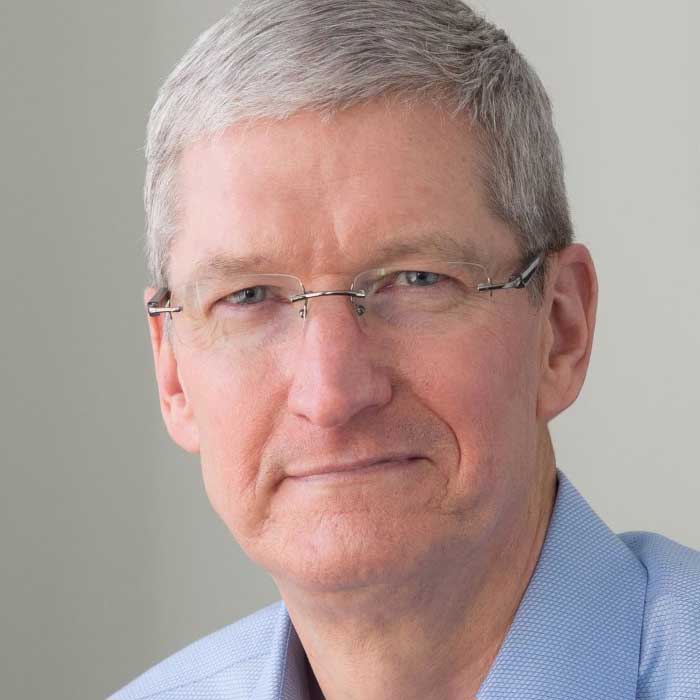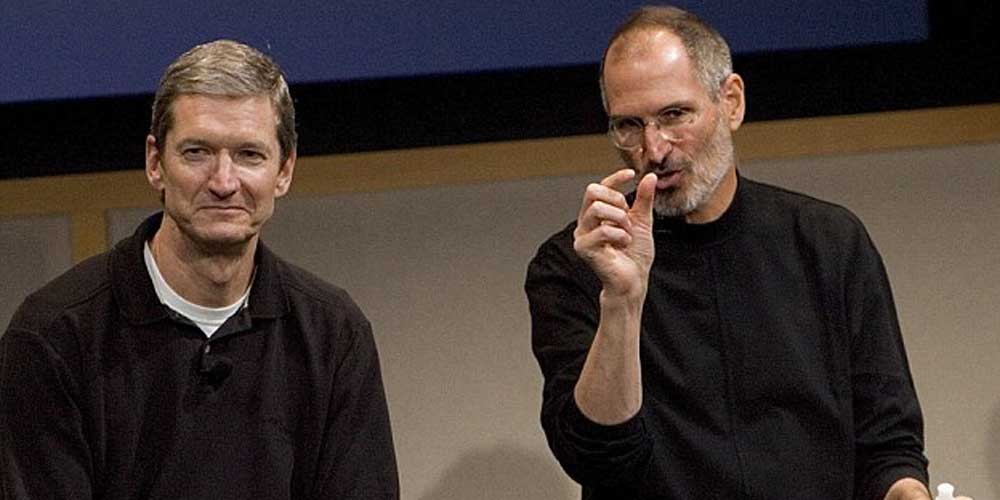
"I'd rather Apple cannibalize Apple than somebody else cannibalize Apple."
- Tim Cook
With his undeniable talents, Apple hired Tim Cook to help the company when it was seen to have no future. His career went no where but up when he later took the role of CEO from one of the most iconic figures, Steve Jobs.
Although Steve Jobs was seen to be irreplaceable, and Cook was to be behind the shadow of Jobs. But his approach and personalities has created a new image for Apple that the future is yet to be written.
Early Life
Timothy Donald Cook was born on November 1st, 1960, in Robertsdale, Alabama. He is the middle of three sons born to father Donald, a shipyard worker, and mother, Geraldine, a homemaker.
Cook graduated second in his class from Robertsdale High School in 1978. He then enrolled at Auburn University in Alabama, where he graduated in 1982 with a Bachelor's degree in industrial engineering, and went on to earn a Master of Business Administration degree from Duke University's Fuqua School of Business in 1988. There, Cook earned the title of Fuqua Scholar - an honor given only to students at the the business school who graduate in the top 10 percent of their class.
Early Career
Tim Cook had worked at a Alabama paper mill and a Virginia aluminum plant in the past. Fresh out of graduate school, Cook embarked on a career in the field of compter technology: He was hired by IBM, where he moved up the ranks to become the computer corporation's North American Fulfillment director, managing manufacturing and distribution functions for IBM's Personal Computer Company in both North and Latin America.
Following a 12-year career at IBM, Cook became a Chief Operating Officer (Reseller Division) at Intelligent Electronics in 1994. Three years later, Cook served as the Chief Operating Officer (COO) of the computer reseller division of Intelligent Electronics, and spent 12 years in IBM's personal computer business as the director of North American Fulfillment.
Cook was Vice President for Corporate Materials at Compaq for seven months before he was hired by Steve Jobs to join Apple in 1998. Cook initially turned down calls from a search firm about an operations position at Apple.
"Steve had hired an executive search firm to find someone to run operations," Cook explained. "I had gotten a call a few times, and said no. They kept calling, and they kept calling." But five minutes into an in-person conversation with Jobs, Cook changed his mind and left his former job immediately.
Career at Apple

"My most significant discovery so far in my life was the result of one single decision: My decision to join Apple," Cook said in an interview, 15 years after joining the corporation.
Tim Cook's first assignment at Apple was Senior Vice President for Worldwide Operations. His job was to clean up the atrocious state of Apple's manufacturing, distribution, and supply apparatus. He began working for Apple in early 1998, before the company had developed the likes of the iMac, iPod, iPhone or iPad, and when it was seeing declining profits instead of profit growth.
According to Cook, prior to accepting his job at Apple, he was told that the company's future looked very bleak: "While Apple did make Macs, the company had been losing sales for years and was commonly considered to be on the verge of extinction. Only a few months before I'd accepted the job at Apple, Michael Dell, the founder and CEO of Dell Computer, was publicly asked what he would do to fix Apple, and he responded, 'I'd shut it down and give the money back to the shareholders,'" Cook explained.
Cook is credited with pulling Apple out of manufacturing by closing factories and warehouses around the world. This helped the company reduce inventory levels and streamline its supply chain to match the efficiency of Dell Inc., dramatically increasing margins.
Less than a year after Cook his Apple debut, the corporation was reporting profits (fiscal year 1998) - an extraordinary shift from it's fiscal 1997 report showed a net loss of $1 billion from the prior fiscal year. These initiatives have proven key to Apple's success of being to unveil next-generation products, keeping them secret until they are ready for distribution to retail, forecasting demand and executing against that forecast.
Cook has been quoted as saying "You kind of want to manage it like you're in the dairy business. If it gets past its freshness date, you have a problem".
In January 2007, Cook was promoted to COO, and served as CEO for two months in 2004 when Jobs was recovering from pancreatic cancer surgery. In 2009, Cook again served as Apple CEO for several months while Jobs took a leave of absence for a liver transplant.
CEO of Apple
It was in August that Jobs asked Cook personally to take over as Apple CEO.
When Cook went to Jobs' house, "He said, 'I want to talk to you about something'," remembers Cook. "This was when he was home all the time, and I asked when, and he said, 'Now.' He told me he had decided that I should be CEO."
In January 2011, Apple's Board of Directors approved a third medical leave of absence requested by Jobs. During that time, Cook was responsible for most of Apple’s day-to-day operations while Jobs made most major decisions. After Jobs resigned as CEO and became Chairman of the Board, Cook was named CEO of Apple Inc. on August 24, 2011.
When Steve Jobs died in October 2011 after a years-long battle with cancer, Tim Cook that was named CEO, also sits on the corporation's Board of Directors.
On October 29, 2012, Cook made major changes to the company's executive team. John Browett, who was SVP of retail, was dismissed after six months on the job. Scott Forstall resigned as senior vice president of iOS, becoming an advisor to Cook until his scheduled departure from the company in 2013. Scott Forstall was removed from his position when he refused to sign the apology for the mistakes Apple did with its Maps app.
Forstall's duties were divided among four other Apple executives: design SVP Jonathan Ive assumed leadership of Apple's Human Interface team, Craig Federighi became the new head of iOS software engineering, while services chief Eddy Cue took over responsibilities for Maps and Siri, and Bob Mansfield (previously SVP of hardware engineering) returned to oversee a new technology group.
The changes to the executive team came after Q3 revenues and profits grew less than predicted, which was the second quarter in a row that Apple failed to meet expectations. Cook's direction since becoming CEO was to build a culture of harmony, and strengthening Apple's ability to innovate from tension and disagreement.
In December 2012, Cook confirmed that Apple would invest $100 million in building some Macs in the United States again starting in 2013.
Cook was named one of Forbes magazine's "World's Most Powerful People." Cook was the highest-paid CEO among large publicly traded companies in 2012. While his salary at Apple amounts to around $900,000, Cook reportedly brings in several millions of dollars annually due to other forms of compensation, including stock awards and bonuses. In 2011, Cook reportedly made $378 million in total compensation.
In April 2012, Time magazine included Cook on its annual 100 Most Influential People in the World list.
Steve Wozniak praised and complimented Cook in running the company. The Apple co-founder was interviewed when he was in Indonesia for a seminar about Innovation & Creativity at Balai Kartini, Tuesday, July 27, 2012. "His focus is not for making money, but to create great products," said Wozniak. He also said that Cook is a remarkable leader for the company he co-founded with Steve Jobs and Ronald Wayne in 1976.
Personal Life
Tim Cook lives in a rented house in Palo Alto, California. As a fitness enthusiast, Cook enjoys hiking, cycling, and going to the gym. He is a brilliant, intelligent and a workaholic. He is known to be as obsessive and exacting as Jobs himself. He is often the first to arrive and the last to leave the office. Cook also regularly begins sending emails at 4:30 am and used to hold Sunday night staff meetings by telephone to prepare for the next week.
In contrast to Steve Jobs, Cook that also serves on the Board of Directors of Nike and the National Football Foundation. He also donated large amounts of money to charity, including $100 million in 2012. He is also less impulsive and able to emotionally detach and implacable. And unlike Jobs, Cook sometimes sits down with his employees at lunchtime, highlighting the contrasting personalities of Apple's former CEOs.
Despite the fact that Cook is constantly measured against the visionary that is Steve Jobs, he hasn't let the comparisons affect him. Cook said in an interview, "I've never felt the weight of trying to be Steve. It's not who I am, and it's not my goal in life." Despite the fact that he was clearly being groomed for the job since at least 2004, Cook never thought he'd be made CEO. He once famously said, “Come on, replace Steve? No. He’s irreplaceable… That’s something people have to get over. I see Steve there with gray hair in his 70s, long after I’m retired.”
As for Steve Jobs, he didn't just see Cook as someone he could rely on at Apple, he also saw him as a friend. Jobs once called Cook's mother because he was concerned about how hard Cook was working.
"One day he calls my mom - he doesn't even know my mom, she lives in Alabama," said Cook. "He said he was looking for me, but he knows how to find me! He talked to her about me. There are lots of these things where you saw the very soft or caring or feeling or whatever you want to call it side of him. He had that gene."
Cook once tried to offer Jobs his liver in a desperate bid to prolong his life.
Cook that serves on Duke University's Board of Trustees, is a quiet man who does very few public appearances. Cook emphasized the importance of intuition in guiding his life's biggest choices, and followed by stating that preparation and hard work are also necessary to execute on that intuition.
Cook was misdiagnosed with multiple sclerosis in 1996. The incidents has made him "see the world in a different way". This was one of the reason he has taken part in numerous charity fundraising to raise money for the disease.
In 2014, Cook that is known for being mostly solitary, became the first CEO of a Fortune 500 company to publicly identify as gay. But still he wants to keep his personal life private despite he did publicly support LGBT rights, and in an editorial, he stated that he's "proud to be gay," and being considered that way is "the greatest gifts God."
In 2015, he received an Honorary Doctorate from George Washington University.
As of March 2015, Cook that own $120 million of Apple's shares and options with a value of $665 million, was estimated to have a net worth of $785 million.
In 2020, when Apple surpassed Saudi's oil company Aramco and closing in on the $2 trillion market cap, Cook has an estimated net worth of over $1 billion.